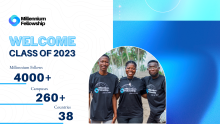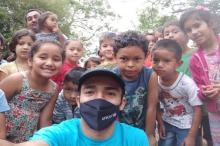Millennium Fellowship Class of 2023: Young Leaders Making the SDGs a Reality
The Millennium Campus Network (MCN) and the United Nations Academic Impact (UNAI) are proud to present the Millennium Fellowship Class of 2023, an ambitious program to help make the Sustainable Development Goals and UNAI principles a reality. The Class of 2023 Millennium Fellows have been selected among a record-breaking 44,369 applicants from over 3,000 campuses across 170 nations.
IT Education Through Cloud-Based Software: Korean University Leads
Startups are seen as an answer to some social challenges facing developing countries, such as jobs, value creation, and sustainability. The software field, from a ‘glocal’ perspective, is the most promising one for startups in developing countries that lack capital. This is because anyone can do business anytime, anywhere in the world, with a computer connected to the Internet without regard for physical or geographical limitations. However, certain developing countries have been unable to capitalize on it due to many constraints.
Academic Community Planting the Future: A Sustainable Initiative
The Sustainable Development Report 2023 – Special Edition says, “forests are among the largest carbon and biodiversity reservoirs on Earth, crucial for mitigating climate change and providing essential goods, services, and livelihoods.” Yet, the same document warns that “nearly 100 million hectares of net forest area have been lost over the past two decades” and “global forest coverage decreased” to 31,2%.
Advancing Nuclear Research: Countering Cancer and Climate Change
Nuclear research is driving innovation in science, technology, medicine, and clean energy for the benefit of communities around the globe. The Nuclear Technology Review 2022 issued by the Director General of the International Atomic Energy Agency, already underlined that “the use of nuclear energy beyond electricity production is enjoying unprecedented momentum worldwide” and that “global interest in research reactors continued to grow.” The report also highlighted the relevance of isotope-based theranostics in cancer
Living Lab in a Dutch University: Towards a More Sustainable and Healthy Food Future
A publication of the United Nations Environment Programme titled Enabling Sustainable Lifestyles in a Climate Emergency launched in 2022 says that “Excessive consumption of animal-based food and food wastage are two major contributors to lifestyles carbon footprints and major causes of other environmental challenges (…) Meat and dairy products, as well as certain kinds of seafood, have high environmental impact, not only per kilogram of food but also per calorie and pe
Fashion Forward: Academia Partnering to Amplify Impact and Innovation
According to the World Bank, fashion is responsible for 10% of annual global carbon emissions. The industry also produces a lot of waste, with 87% of fiber inputs incinerated or disposed of in a landfill and 20% of global wastewater worldwide is generated from fabric dyeing and treatment. Innovators and entrepreneurs are addressing these issues and finding solutions on their fashion journey.
Sustainable Energy Behavior: Ukrainian University Studies Digital Public Goods
Given the world’s challenges, including climate change concerns, efforts are being made globally to make the transition to renewable energies a reality. To explore how digital public goods could be used for such purpose, a team from Odesa I.I.
Integrating Refugee Students: The Model of a Portuguese University
Some eight years ago, the flow of persons needing international protection to the European continent increased significantly, and many asylum seekers and refugees were in the typical higher education age range.
University in New Zealand Delivers Inclusive and Equitable Quality Education
Within the 2030 Agenda for Sustainable Development, Goal 4: Quality Education aspires to inclusive and equitable quality education and lifelong learning opportunities for all.
Addressing Violence Against Children: Paraguayan University Students Step In
“Violence against children is prevalent in each country where it is measured. Every survey conducted to date concerning violence against children has found that it is a significant and prevalent problem,” warns a UNICEF report about this situation in Latin America and the Caribbean.










